Egypt
Security forces on Saturday maintained tight control in Cairo’s Tahrir Square, the epicentre of Egypt’s 2011 revolution, after protests in several cities calling for the removal of President Abdel Fattah al-Sisi.
In a rare show of dissent, hundreds of Egyptians poured through the streets of Cairo late Friday, chanting slogans including “Leave, Sisi!” and demanding the “fall of the regime”.
At least 74 people were arrested after clashes between the crowds and police in the capital, a security source told AFP.
On Saturday, security forces were deployed in force in Tahrir Square and plain clothed agents patrolled sidestreets of downtown Cairo.
The protests came on the back of an online call posted by Mohamed Aly, a disgruntled exiled Egyptian businessman, demanding Sisi be toppled.
He upped the pressure on Saturday in an expletive-filled video, imploring Egyptians to join in a “million-man march” next Friday and to fill all “major squares” of the country.
“I was also surprised like you by your turnout on the streets,” he said, in a direct appeal to his online followers posted on his Facebook page.
“This is a people’s revolution… We have to link up together as one… and organise going down to the major squares,” Aly said.
Corruption
The construction contractor has been posting videos from Spain that have gone viral since early September, accusing Sisi and the military of rampant corruption.
The president flatly denied the allegations last week at a youth conference and sought to assure Egyptians that he “was honest and faithful” to his people and the military.
But Egyptians heeded Aly’s calls to take to the streets on Friday after a highly-charged football match between Cairo powerhouses Al Ahly and Zamalek.
“I think it’s safe to say that the events of the past few weeks, including the development last night, pose the most serious legitimacy crisis facing Sisi,” Nael Shama, a Cairo-based political analyst, told AFP.
“No one shouted bread, freedom, social justice like in 2011, they escalated straight to ‘Leave’ from the first minute,” Shama noted.
Demonstrations
Thousands shared footage on social media documenting the demonstrations, which sprang up in several cities, including sizeable crowds blocking traffic in Alexandria, Al-Mahalla, Damietta, Mansoura and Suez.
Shama, who wrote a book on Egypt’s foreign policy, said the “totally organic” nature of the small-scale protests was “unprecedented”.
“This is the first time people take to the streets in many years but I am not sure it will be the last,” he added.
Under the rule of general-turned-president Sisi, authorities have launched a broad crackdown on dissidents, jailing thousands of Islamists as well as secular activists and popular bloggers.
2013 Arabspring
Sisi led the military ouster of Islamist president Mohamed Morsi in 2013, two years after the revolution that toppled longtime leader Hosni Mubarak, and won back-to-back landslide elections after running virtually unopposed.
The country effectively banned protests under a 2013 law and a state of emergency is still in full effect.
Sisi has regularly invoked security and stability as hallmarks of his reign in contrast to the situations in regional hotspots such as Libya and Syria.
During last week’s youth conference, Sisi again took the opportunity to warn of the dangers of protesting.
The muslim brotherhoodr
On television Friday night, boisterous and pro-Sisi host Amr Adib lambasted Aly, the businessman, showing footage of him allegedly in a drunken stupor.
Adib urged his fellow countrymen to “take care of the country… because the Muslim Brotherhood want to raze it to the ground”.
The Islamist group, once considered one of Egypt’s most organised political forces, was outlawed as a terror group in 2013 after Morsi’s overthrow.
Egyptians quickly took to social media to criticise Adib, a vocal backer of Mubarak during the revolution, for dismissing the protesters as “people against the country”.
Discontent over rising prices has been swelling in Egypt, where Sisi’s government has imposed strict austerity measures since 2016 as part of a $12-billion loan package from the International Monetary Fund.
Right to protest
Nearly one in three Egyptians live below the poverty line on less than $1.40 a day, according to official figures released in July.
Human Rights Watch urged Egyptian authorities on Saturday to “protect the right” to protest peacefully and demanded that those arrested be released.
Sisi flew Friday night to New York, where he is scheduled to address the UN General Assembly next week.
The president’s office did not comment on the protests, when asked by AFP on Saturday.
“Now the ball is in the government’s court,” said Shama, the analyst. “They have to respond somehow.”
AFP



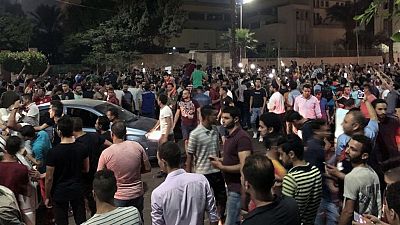

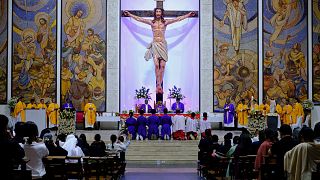

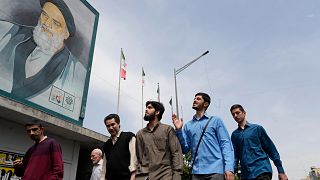

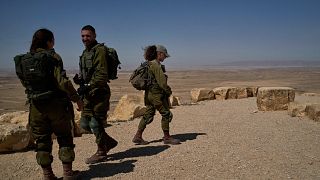
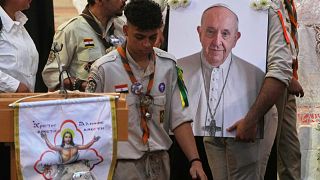



01:42
Cairo service honours Pope Francis' legacy
Go to video
Letsile Tebogo shines at FNB Golden Prix ahead of 2025 World Championships
01:01
Salah signs new Liverpool deal
Go to video
Gaza: Egypt's foreign minister rejects displacement of Palestinians
Go to video
Haitians demand protection from surging gang violence
Go to video
Zimbabwe charges dozens for taking part in protests against President